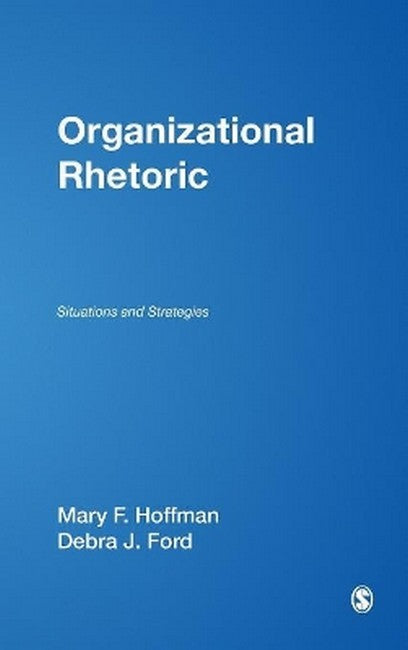Mary F. Hoffman (Ph.D., University of Kansas) is associate professor and chair in the Department of Communication and Journalism at the University of Wisconsin-Eau Claire. She teaches courses in organizational rhetoric, organizational communication and rhetorical criticism. Her research is concerned with how individuals negotiate organizational demands that conflict with personal values. Her work on three organizations of Benedictine nuns has been published in Communication Studies, Western Journal of Communication, and Journal of Communication and Religion. Her work on how individuals and organizations negotiate the idea of work/life balance has appeared in Qualitative Research Reports in Communication and Communication Quarterly. Debra J. Ford (Ph.D., University of Kansas) is assistant dean for student affairs and research assistant professor at the University of Kansas School of Nursing. She also teaches in the University of Kansas Department of Communication Studies. She has worked for twelve years in recruitment, advising and administration in nursing education, and has taught for ten years. She teaches courses in organizational communication, organizational rhetoric, leadership, communication theory and health communication. Her research focuses on strategies used by organizations to influence public policy, group communication processes in public-private partnerships, and the scholarship of teaching and learning. She has published articles in Communication Theory, Health Communication, Western Journal of Communication, and Communication Studies, among others. She is the principal investigator on a U. S. Dept. of Education GAANN grant.
Request Academic Copy
Please copy the ISBN for submitting review copy form
Description
Preface Acknowledgments 1. Organizations and Rhetoric in Contemporary Culture Defining Rhetoric Defining an Organization Defining Organizational Rhetoric Understanding Organizational Rhetoric Characteristics of Organizational Rhetoric Reasons for Studying Organizational Rhetoric Goals for Studying Organizational Rhetoric Practical Outcomes of Studying Organizational Rhetoric A Process for Analyzing Organizational Rhetoric Conclusion 2. Identifying Rhetorical Strategies in Organizational Rhetoric Canon of Invention Canon of Organization in Organizational Rhetoric Canon of Style in Organizational Rhetoric Canon of Delivery in Organizational Rhetoric Interdependence of Invention, Organization, Style, and Delivery in Organizational Rhetoric Canon of Memory in Organizational Rhetoric Special Situations and Rhetorical Strategies Conclusion Worksheet for Identifying Rhetorical Strategies in Organizational Texts 3. Rhetorical Situations in Organizations The Importance of Context in Rhetoric Two Perspectives on Rhetorical Situations The Rhetorical Situation in Organizational Rhetoric Researching the Rhetorical Situation Conclusion Case Study: A Showdown Over Power in Texas Worksheet for Describing Rhetorical Situations in Organizations 4. Critical Approaches to Organizational Rhetoric Historical Overview Key Ideas in Critical Approaches to Organization Studies and Organizational Rhetoric Summary of the Key Concepts in Critical Theory/Perspectives Making Choices: Ethics and Organizational Rhetoric Conclusion Note 5. Evaluating and Critiquing Organizational Rhetoric Two Approaches to Analyzing Organizational Rhetoric Conclusion Worksheet for Conducting an Evaluative Reading Worksheet for Conducting a Critical Reading 6. Identity Creation and Maintenance Rhetoric The Foundation for Identity Rhetoric: Organizational Identity Identity Building Rhetoric Identity Maintenance Rhetoric Evaluating and Critiquing Identity Creation and Maintenance Rhetoric Conclusion Case Study: "Who Says the Internet Is Only For Young People?" Identity and Disaster Relief 7. Rhetoric About Issues Defining Issues and Issue Management in Organizations Foundation for Understanding Issues Rhetoric: Issue Life Cycles Issue Management: The Rhetorical Situation Strategies for Rhetoric About Issues Evaluating and Critiquing Rhetoric About Issues Conclusion Case Study: Menu Labeling---Healthy Idea or Big Brother? 8. Rhetoric About Organizational Risk Defining Risk in Organizations Foundations for Understanding Risk Rhetoric The Rhetorical Situation for Risk Rhetoric Strategies for Rhetoric About Risk Evaluating and Critiquing Rhetoric About Risk Conclusion Case Study: No Bodies in My Backyard 9. Crisis Rhetoric Defining Rhetoric About Crisis Foundation for Understanding Crisis Rhetoric: Life Cycle of a Crisis Crisis Management: The Rhetorical Situation Strategies in Crisis Rhetoric Evaluating and Critiquing Organizational Rhetoric About Crisis Case Study: The Perfect Storm 10. Organizational Rhetoric for Internal Audiences The Rhetorical Situation in Internal Organizational Rhetoric Rhetorical Strategies for Internal Messages Evaluating and Critiquing Internal Organizational Rhetoric Conclusion Case Study: A New Record---Transitioning to Electronic Medical Records Epilogue: The Ancient Art of Rhetoric in a Complex Organizational World Rhetoric in a Globalized Organizational World Corporate Rhetoric in Nonprofit Organizations Traditional Rhetorical Strategies in Contemporary Forms The Environment as Situation and Strategy Appendix: Worksheets for Analyzing Organizational Rhetoric Worksheet for Identifying Rhetorical Strategies in Organizational Texts Worksheet for Describing Rhetorical Situations in Organizations Worksheet for Conducting an Evaluative Reading Worksheet for Conducting a Critical Reading References Index About the Authors

